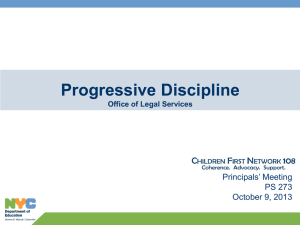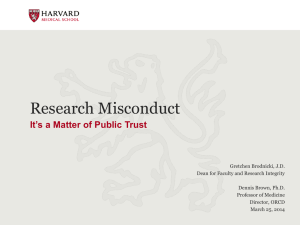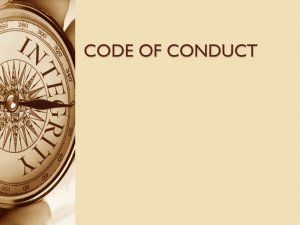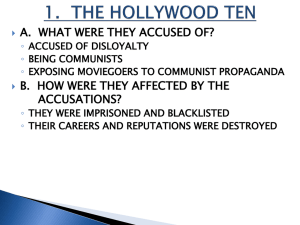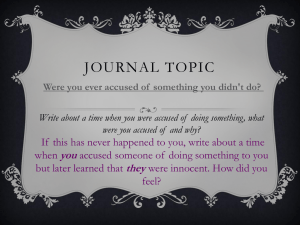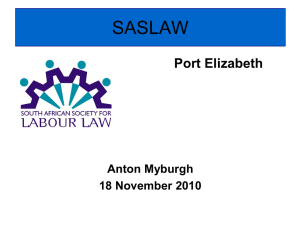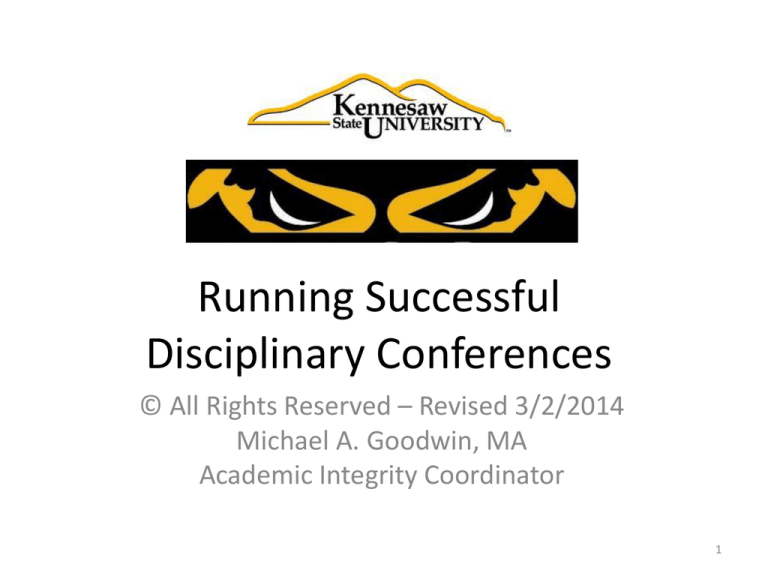
Running Successful
Disciplinary Conferences
© All Rights Reserved – Revised 3/2/2014
Michael A. Goodwin, MA
Academic Integrity Coordinator
1
Kennesaw State University
• Located in the northwest suburbs of Atlanta, Georgia.
• Established in 1963 as Kennesaw Junior College with
enrollment of 1,014 students.
• Grew into a four year college and then university, with
enrollment now at ~25,000 students.
• The Student Code of Conduct is a modified honor code
enforced by the Student Conduct and Academic Integrity
department (SCAI), encompassing academic misconduct,
general misconduct, and residential misconduct.
2
Academic Misconduct Preamble
II. Academic Honesty
The high quality of education at Kennesaw State University is reflected
in the credits and degrees its students earn. The protection of high
standards of academic integrity is crucial since the validity and equity
of the University's grades and degrees depend upon it. Any student
found to have violated any KSU academic honesty regulation after a
hearing before a university hearing panel or before a hearing officer
shall be suspended for at least one semester, unless the student
persuades the deciding body or hearing officer that the
circumstances of his or her behavior substantially mitigate the gravity
of the violation. These regulations are designed to assist students in
(1) developing appropriate attitudes about, and (2) understanding and
following the university’s standards relating to academic honesty. The
regulations protect students by helping them avoid committing
infractions that may compromise the completion of their KSU degrees
or damage their reputations.
3
Cheating Policy
• “No student shall receive, attempt to receive,
knowingly give or attempt to give unauthorized
assistance in the preparation of any work required to
be submitted for credit (including examinations,
laboratory reports, essays, themes, term papers, etc.).”
• “Unless specifically authorized, the presence and/or
use of electronic devices during an examination, quiz,
or other class assignment is considered cheating.”
• “Engaging in any behavior which a professor prohibits
as academic misconduct in the syllabus or in class
discussion is cheating.”
4
Plagiarism & Self-Plagiarism Policy
• “When direct quotations are used, they should be
indicated, and when the ideas, theories, data, figures,
graphs, programs, electronic based information or
illustrations of someone other than the student are
incorporated into a paper or used in a project, they
should be duly acknowledged.”
• “No student may submit the same, or substantially the
same, paper or other assignment for credit in more
than one class without the prior permission of the
current professor(s).”
5
Professor Finds Alleged
Academic Misconduct
Professor Contacts SCAI To Check
For Prior Academic Misconduct
First Offense
Professor Seeks
Informal Resolution
(Disciplinary Conference)
Repeat Offender
Professor Seeks
Suspension
Formal Hearing
Student Accepts
Responsibility
Academic
Sanction
Student Denies
Responsibility
Satisfactory
Explanation
Charges
Dropped
Unsatisfactory
Explanation
Student
Responsible
Student Not
Responsible
Suspension / Expulsion
Academic Sanction
6
Before Disciplinary Conference
• The professor and facilitator select the time, date,
and location of the meeting, making sure not to
conflict with the student’s class schedule.
• The professor notifies the accused student of the
scheduled meeting. It is not necessary to explain
that the meeting is related to academic
misconduct, although professors may do so.
• The professor gathers all available evidence
ahead of the conference.
7
Disciplinary Conference Steps
1. All parties introduce themselves.
2. Facilitator briefly explains the disciplinary
conference model, including the three
possible outcomes (academic sanction[s],
dropped charges, or formal hearing).
3. Professor explains the specific charge and
shows evidence of misconduct.
8
Disciplinary Conference Steps
4. Both the professor and facilitator ask the
student questions to understand what
happened.
5. The accused student has a chance to explain
her side of the story (and perhaps apologize).
6. The professor and facilitator discuss the
ethical issues associated with the allegation
(especially how these issues apply in the
“real world” beyond college).
9
Disciplinary Conference Resolution
If the accused admits responsibility for the alleged
offense:
1. The professor chooses an academic sanction
(grade penalty for assignment, grade penalty for
course, re-do assignment, new assignment, or
combination thereof).
2. The professor documents the violation and
resolution with an Academic Misconduct
Incident Form signed by both parties and sends
this document to SCAI.
10
Disciplinary Conference Resolution
If the accused denies responsibility for the
alleged offense—
• —and the professor accepts the explanation,
the conference ends with all charges dropped.
• —and the professor still believes that a
violation took place, the conference ends. The
professor alone signs the Academic
Misconduct Incident Form and sends it to SCAI
with all evidence to initiate a formal hearing.
11
Choosing the Right Sanction
• Assigning a grade penalty is relatively easy. The
most common sanction is “0” for the assignment,
or a course grade deduction if a “0” would not
have meaningful impact.
• The more advanced the course, the stricter any
grade penalties should be. It is reasonable to
expect more from seniors than freshmen, and still
more from graduate students. Some majors are
stricter or have standardized penalties.
12
Choosing the Right Sanction
• Assigning new work (or requiring a re-do) also
means more work for the professor. Reserve
these sanctions for clear learning
opportunities and unintentional (but still
actionable) offenses.
• Don’t take a cookie cutter approach. Look at
all mitigating and exacerbating factors and
compare the current case to similar violations.
Let precedent inform rather than dictate.
13
Choosing the Right Sanction
• Balance mercy and justice. Sanctions should
be fair to the accused student’s classmates
who did the right thing, but everyone makes
mistakes. Be developmental, not punitive.
• Reward cooperation and remorse. The more a
student works with the process and owns her
mistakes, the lighter the sanction needs to be.
14
Choosing the Right Sanction
• Beware of proscribed sanctions in a course
syllabus (e.g. “If you cheat in my class, I will
fail you for the course.”). Such statements can
deter offenses, but limit options when the
professor wishes to be more lenient (or
harsher).
• Be mindful of personal precedent. How you
treat one student for a specific offense should
guide future resolution of similar cases.
15
Unintentional Violations
• First semester freshmen probably deserve a
bit of slack at the start of the term,
particularly as they may not understand what
constitutes plagiarism. Treat early mistakes as
learning experiences and warnings, rather
than lingering black marks on their record.
• It does not matter whether a student knows
the rules. It only matters whether she has had
a reasonable opportunity to learn the rules.
16
International Students
• These students may not be familiar with
academic integrity standards. This doesn’t excuse
misconduct, but professors should be as clear as
possible when giving instructions and elicit
feedback that shows understanding.
• Some cultures take a collectivist approach to
knowledge in which data belongs to the culture
as a whole rather than the discoverer. For such
students, the very notion of plagiarism can be
baffling and require additional effort to explain.
17
International Students
• In some cultures, it is considered highly
disrespectful to change the words of an expert
rather than quote her verbatim. Such students
typically have great difficulty with
paraphrasing.
• In other cultures, students have a deeply
entrenched “us vs. them” animosity toward
faculty that normalizes collaborative cheating
among students.
18
International Students
• Foreign students with a student visa have much
more to fear from suspension. Don’t let them
rush into signing a form and take responsibility
out of fear without clear evidence of a violation.
• Accommodate and care, but don’t lower
standards. International students chose to leave
their home country and study abroad. That
means they have a duty to understand the
expectations of their chosen institution.
19
Variations and Variables
• The accused student may be prompted to talk
first (i.e. “Why do you think I’ve called you in
here?”).
• If the student’s answers and explanation
reveals problems that campus resources can
help with (like the counseling office, writing
center, etc.), pause to explain those resources
and provide contact information. Doing this
may prevent future misconduct.
20
Variations and Variables
• If the student is persistently hostile and/or
uncooperative, the facilitator should end the
conference and take the case back to SCAI for a
formal hearing.
• If the professor or facilitator anticipates a
dangerous or even violent reaction, a disciplinary
conference is probably not appropriate. If parties
wish to go ahead, they should arrange for campus
police/security to be nearby.
21
Variations and Variables
• “I didn’t do it, but I can’t risk getting suspended!”
is not taking responsibility. Informal resolution via
disciplinary conference is reserved for those who
admit wrongdoing.
• Ask a student who has admitted misconduct to
step outside and come up with a suggested
sanction. Even if the professor already has a plan,
the student may have a better idea. This also
allows the facilitator and professor to brainstorm
and discuss precedents.
22
Good Cop, Good Cop
• A disciplinary conference is not an interrogation.
It is a chance for a wrongdoer to take
responsibility for her actions. No one should be
out to “get them” for their offense. The goal is
rehabilitation and better decisions in future.
• Facilitators should be multipartial advocates, not
impartial mediators. This means helping the
faculty accuser through the process, while also
trying to get the best possible outcome for the
accused. Both sides deserve compassion and aid.
23
This Is Personal
• Accusing a student of academic misconduct can
prompt anger, fear, and other strong emotions.
• Have a tissue box handy so the disciplinary
conference isn’t interrupted by the accused
leaving to compose himself. Many students cry.
• The professor likely also feels strong feelings
(anger at the betrayal of trust, sadness,
disappointment, etc.). Part of the facilitator’s job
is to be a level-headed voice of reason.
24
Parents, Partners, Lawyers, Etc.
• Option #1: Don’t. The accused student is an adult
and should face the consequences of her actions.
• Option #2: Provided the accused student signs a
FERPA waiver, her parent(s), spouse, attorney, or
other important party may be present, but
cannot participate in any way.
• Option #3: As per option 2 above, but the guest
may also ask questions.
• This is a privilege, not a right. Eject guests who
are belligerent or interfere with the proceedings.
25
No-Shows
If a student fails to attend a scheduled disciplinary
conference, the professor has several options:
1. Reschedule. This is the nicest option, but
probably shouldn’t be done more than once.
2. Schedule a formal hearing, but allow the
accused to come to the SCAI office any time
prior to the hearing and sign the form accepting
the sanction chosen by the professor.
3. Schedule a formal hearing.
26
Other Tips and Tricks
• Consistently demonstrate empathy. Students
often feel that hearing officers don’t
understand their challenges, especially if a
notable age difference exists. Consider sharing
relevant personal anecdotes.
• Break the violation down into a series of
smaller decisions, showing each point at
which the student could have chosen a better
path (and hopefully will in future).
27
Other Tips and Tricks
• Let students save face. Once they have admitted
to any academic misconduct, resolution is
possible. It isn’t usually necessary to press the
point and try to force confession of
greater/additional violations.
• Insisting that an accused student reveal other
offenders to informally resolve his case can crack
a cheating ring, but this can feel like blackmail
and will likely result in lingering resentment.
28
Other Tips and Tricks
• Meeting in a professor’s office often feels less
formal (and thus less scary) for many students.
This should factor into deciding an appropriate
venue for the disciplinary conference.
• Don’t forget FERPA. Professors with a shared
office (like many adjuncts) shouldn’t use that
space for disciplinary conferences unless they can
be assured of privacy. Booking a conference room
can provide true neutral ground.
29
Other Tips and Tricks
• Semantics matter. The accused should feel like
she made a bad choice, not that she is a bad
person. Sending that impression can provoke
defensiveness, despair, or even shut down all
meaningful participation in the conference.
• Be mindful of body language. Even if the
facilitator and professor choose their words
carefully, their gestures and facial expressions can
send a different (and more judgmental) message.
30
Other Tips and Tricks
• Try to relate discussion of ethics to the accused
student’s own life, interests, and intended career
path. The more that academic integrity feels
relevant (not just collegiate red tape), the more
likely the student will internalize intended values.
• Some students will adamantly deny misconduct
in the face of overwhelming evidence and accept
suspension rather than admit wrongdoing. Don’t
let such individuals get you down.
31
Other Tips and Tricks
• Don’t schedule a conference without a
preponderance of evidence. False allegations
destroy mentor-mentee relationship.
• If a paper has a complete works cited and internal
citations, but lacks quotation marks, it is likely the
plagiarism is a result of poor skill and not
deceptive intent. Noting such mitigating details
on the Academic Misconduct Form encourages
the accused to cooperate.
32
Other Tips and Tricks
• Word will get around. Students talk among
themselves. Be fair and consistent in sanctioning
as much as possible for similar violations.
• Prevention is always best. Emphasize academic
integrity expectations on day one, but reiterate
expectations with each assignment. Without this,
students may dismiss the policy as red tape.
• Students who know their professors take
academic integrity seriously are less likely to
violate the policy.
33
Reference Links
• KSU main website: www.kennesaw.edu
• SCAI website: www.kennesaw.edu/scai
• KSU Student Code of Conduct:
https://web.kennesaw.edu/scai/content/ksu-studentcode-conduct
• Academic Misconduct Incident Form:
https://web.kennesaw.edu/scai/sites/web.kennesaw.edu
.scai/files/academic_misconduct_form_0.doc
• Contact Info: mgoodwin@kennesaw.edu 770-499-3403
34

